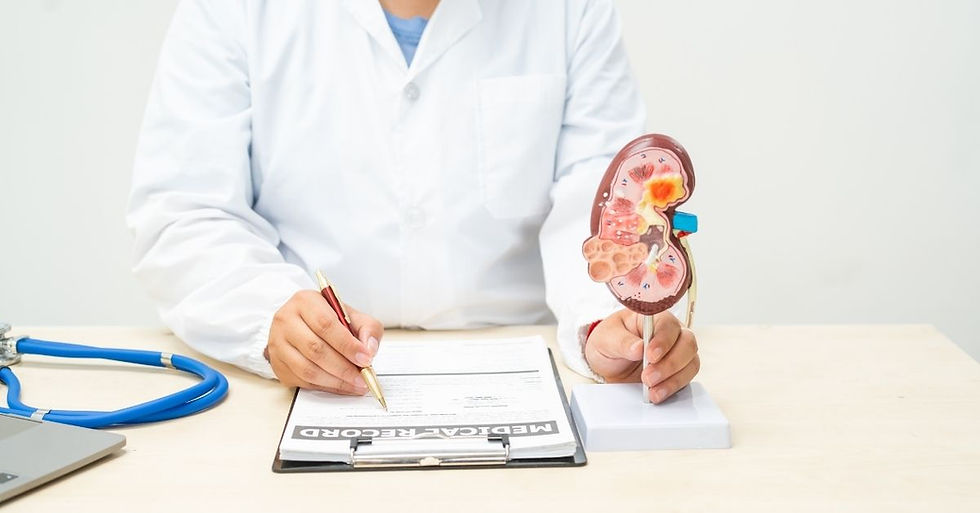Understanding Kidney Stones: Causes and Prevention
- plurefy com
- Apr 12, 2025
- 5 min read
Kidney stones are a prevalent yet excruciating condition that affects millions globally. These small, hard mineral deposits can form in the kidneys, often leading to severe pain and discomfort. Individuals can better manage and potentially prevent this distressing condition by gaining a comprehensive understanding of the causes, symptoms, and prevention methods for kidney stones.
What Are Kidney Stones?

Kidney stones are solid deposits composed of minerals and salts that develop within the kidneys. They can range in size, from minuscule grains of sand to as large as a golf ball. While some kidney stones can pass through the urinary tract without causing any symptoms, others may lead to significant pain and complications.
Composition of Kidney Stones
Kidney stones are primarily made up of minerals and salts. The most common types include calcium stones, uric acid stones, struvite stones, and cystine stones. Each type has a unique composition and formation process, influenced by various dietary and environmental factors. Understanding these differences can be crucial in determining the most effective prevention and treatment strategies.
Varied Sizes and Their Implications
The size of kidney stones can vary significantly, influencing the symptoms and treatment options. Smaller stones might pass unnoticed, while larger stones can obstruct the urinary tract, causing intense pain and potential damage to the kidneys. The size of the stone often dictates the level of intervention required, ranging from increased fluid intake to surgical procedures.
Risk Factors and Susceptibility
Several factors can increase an individual's susceptibility to developing kidney stones, including age, gender, family history, and lifestyle choices. Men are generally more prone to kidney stones than women, and the risk increases with age. Additionally, a family history of kidney stones can significantly heighten one's risk, emphasizing the importance of understanding personal and familial medical history.
Causes of Kidney Stones

Understanding the root causes of kidney stones is essential for effective prevention and management. While several factors contribute to stone formation, they can often be attributed to lifestyle and dietary choices, medical conditions, and genetic predispositions.
Dehydration
Dehydration is one of the most prevalent causes of kidney stones. Inadequate fluid intake leads to concentrated urine, which allows minerals and salts to crystallize and form stones. Chronic dehydration, often due to insufficient water consumption or excessive sweating, significantly increases the risk of stone development.
Diet
Diet plays a critical role in the formation of kidney stones. Diets rich in protein, sodium, and sugar can elevate the risk, with high sodium intake causing increased calcium excretion in urine. Furthermore, diets high in oxalate-rich foods, such as spinach and nuts, can promote stone formation, making dietary adjustments a key preventive measure.
Medical Conditions
Certain medical conditions can predispose individuals to kidney stones. Conditions like hyperparathyroidism, which affects calcium regulation, and renal tubular acidosis, a kidney disorder, can increase stone risk. Additionally, urinary tract infections and digestive diseases can alter urine composition, promoting stone development.
Family History
Genetics can significantly influence the likelihood of developing kidney stones. A family history of the condition suggests a genetic predisposition, with certain inherited disorders affecting mineral metabolism and increasing stone risk. Understanding familial health patterns can be invaluable in assessing personal risk.
Symptoms of Kidney Stones

Recognizing the symptoms of kidney stones is crucial for timely diagnosis and treatment. Symptoms can vary based on the stone's size and location, with some cases requiring immediate medical attention to prevent complications.
Severe Pain
Severe pain is the hallmark symptom of kidney stones, often described as sharp and cramping. This pain usually begins suddenly and can be intermittent, radiating from the back to the abdomen or groin. The intensity and location of the pain can provide clues to the stone's size and position within the urinary tract.
Changes in Urination
Kidney stones can cause noticeable changes in urination patterns. Increased frequency, pain during urination, or the presence of blood in the urine are common signs. Urine may also appear cloudy or have a strong odor, indicating potential infection or stone-related irritation.
Nausea and Vomiting
The intense pain associated with kidney stones can trigger nausea and vomiting. This response is the body's way of reacting to severe discomfort, and it may worsen with movement or attempts to pass the stone.
Fever and Chills
When kidney stones lead to infections, fever and chills can occur. These symptoms indicate a potential infection, requiring prompt medical evaluation and treatment to prevent further complications and kidney damage.
Preventing Kidney Stones

Prevention is key in managing kidney stone risk, with lifestyle and dietary modifications playing a significant role. By adopting healthy habits, individuals can reduce their likelihood of developing stones and improve overall kidney health.
Stay Hydrated
Adequate hydration is the most effective strategy for preventing kidney stones. Consuming at least eight glasses of water daily helps dilute urine, reducing mineral concentration and stone formation risk. In hot climates or during physical activity, increased fluid intake is essential to compensate for water loss through sweating.
Eat a Balanced Diet
A balanced diet low in sodium, animal protein, and sugar can significantly reduce kidney stone risk. Emphasizing fruits, vegetables, whole grains, and low-fat dairy helps maintain optimal urinary health. Limiting oxalate-rich foods and pairing them with calcium-rich options can further minimize stone formation.
Maintain a Healthy Weight
Being overweight is a risk factor for kidney stones, making weight management crucial. Regular exercise and a balanced diet not only prevent stone formation but also contribute to overall health. A healthy weight reduces stress on the kidneys and supports efficient metabolic function.
Monitor Calcium and Oxalate Intake
While calcium is vital for bone health, excessive intake can contribute to stone formation. Opting for dietary calcium rather than supplements and balancing calcium and oxalate-rich foods can prevent stones. Consulting a healthcare provider for personalized dietary recommendations is advised.
Limit Sodium
Reducing sodium intake is essential for kidney stone prevention, as high sodium levels increase urinary calcium excretion. Aim for no more than 2,300 milligrams of sodium per day, and choose low-sodium alternatives when possible. Reading food labels and preparing meals at home can help manage sodium intake effectively.
Consult Your Doctor
For those with a history of kidney stones or genetic predisposition, regular consultation with a healthcare provider is crucial. Doctors can recommend medications or supplements tailored to individual risk factors. Routine check-ups allow for early detection and management of potential complications.
Treatment Options for Kidney Stones

Treatment for kidney stones varies based on the stone's size, type, and location. Understanding available options can help individuals make informed decisions and seek appropriate medical care when needed.
Home Remedies
For small kidney stones, home remedies can be effective. Drinking plenty of water and using over-the-counter pain relievers can facilitate stone passage. Staying active and applying heat to the affected area can also alleviate discomfort and promote natural stone expulsion.
Medical Treatment
Larger stones or those causing significant symptoms may require medical intervention. Doctors might prescribe medications to relax the ureter muscles, easing stone passage. In severe cases, procedures like shock wave lithotripsy or surgery may be necessary to break up or remove the stones.
Post-Treatment Care
After treatment, preventive measures are essential to reduce recurrence risk. Continued hydration, a balanced diet, and regular medical check-ups can maintain kidney health. Monitoring dietary habits and adjusting lifestyle choices can prevent future stone formation and ensure long-term well-being.
Conclusion
Kidney stones can be a painful and disruptive condition, but understanding their causes and prevention can help manage your risk. By staying hydrated, eating a balanced diet, and maintaining a healthy lifestyle, you can reduce your chances of developing kidney stones. If you experience symptoms of kidney stones, seek medical attention promptly to prevent complications.
With the right knowledge and habits, you can take control of your kidney health and reduce the risk of future stones.










Comments